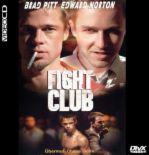 |
Fight Club is a 1999 American feature film adaptation of the 1996 novel of the same name by Chuck Palahniuk, adapted by Jim Uhls and directed by David Fincher. The novel was optioned by producer Laura Ziskin, who hired Uhls to write the script for the film. Several directors were sought to film Fight Club; David Fincher was hired to direct based on his interest in the project despite previous difficulties with the studio 20th Century Fox. Major actors and actresses were considered by the studio to help promote the film, and actors Brad Pitt, Edward Norton, and Helena Bonham Carter were ultimately cast into the lead roles. Fincher worked with Uhls to develop the script, seeking advice from others in the film industry and his own cast members. |
| Fincher described Fight Club as a black comedy that applies heavy satire; he and the cast also compared the film to The Graduate (1967) and Rebel Without a Cause (1955). Thematically, the film was intended to represent the conflict between a generation of young people and the value system of advertising. The film's use of violence in the fight clubs was intended to serve as a metaphor for feeling based on the generation's conflict. The nameless protagonist, portrayed by Edward Norton,is an everyman and an unreliable narrator who becomes involved in a fight club with Tyler Durden (Brad Pitt) and is conflicted in a relationship triangle with Durden and Marla Singer (Helena Bonham Carter). The director carried homoerotic overtones over from Palahniuk's novel to implement in the film, believing that the overtones would make audiences uncomfortable and thereby keep them from anticipating the twist ending. Studio executives were not receptive to the film, and they altered Fincher's intended marketing campaign to try to recoup perceived losses. Fight Club failed to meet expectations at the box office, and the film received polarized reactions from film critics. The film was cited as one of the most controversial and talked-about films of 1999. It was perceived as crossing a milestone for visual style in cinema and introducing a new mood in American political life. The film later found commercial success with its DVD release, which established Fight Club as a cult film. The film has also permeated American society, inspiring people to set up fight clubs. |
 |
The narrator (Edward Norton) is an automobile company employee who travels to accident sites to perform product recall cost appraisals. His doctor refuses to write a prescription for his insomnia and instead suggests that he visit a support group for testicular cancer victims in order to appreciate real suffering. By attending the group, the narrator feels distraught at the condition of these ill fated people and breaks down. He is then able to sleep soundly and subsequently fakes more illnesses so he can attend other support groups in order to get out his pent up emotions through crying. The narrator's routine is disrupted when he begins to notice another impostor, Marla Singer (Helena Bonham Carter), at the same meetings and his insomnia returns. |
| During a flight for a business trip, the narrator meets Tyler Durden (Brad Pitt), who is a soap salesman. The narrator arrives home to find his apartment has been destroyed by an explosion. He calls Tyler and meets him at a bar. Tyler agrees to let the narrator stay at his home on the condition that the narrator hits him. The narrator complies and the two end up enjoying a fist fight outside the bar. The narrator moves into Tyler's dilapidated house and the two return to the bar, where they have another fight in the parking lot. After attracting a crowd, they establish a 'fight club' in the bar's basement. |
 |
When Marla overdoses on Xanax, she is rescued by Tyler and the two embark upon a sexual relationship. Tyler tells the narrator never to talk about him with Marla. Under Tyler's leadership, the fight club becomes "Project Mayhem," which commits increasingly destructive acts of anti-capitalist vandalism in the city. The fight clubs become a network for Project Mayhem, and the narrator is left out of Tyler's activities with the project. After an argument, Tyler disappears from the narrator's life and when a member of Project Mayhem dies on a mission, the narrator attempts to shut down the project. Tracing Tyler's steps, he travels around the country to find that fight clubs have been started in every major city, where one of the participants identifies him as Tyler Durden. A phone call to Marla confirms his identity and he realizes that Tyler is an alter ego of his own split personality. Tyler appears before him and explains that he controls the narrator's body whenever he is asleep.
The narrator faints and awakes to find Tyler has made several phone calls during his blackout and traces his plans to the downtown headquarters of several major credit card companies, which Tyler intends to destroy in order to cripple the financial networks. Failing to find help with the police, many of whom are members of Project Mayhem, the narrator attempts to disarm the explosives in the basement of one of the buildings. He is confronted by Tyler, knocked unconscious, and taken to the upper floor of another building to witness the impending destruction. The narrator, held by Tyler at gunpoint, realizes that in sharing the same body with Tyler, he is the one who is actually holding the gun. He fires it into his mouth, shooting through the cheek without killing himself. The illusion of Tyler collapses with an exit wound to the back of his head. Shortly after, members of Project Mayhem bring a kidnapped Marla to the narrator and leave them alone. The bombs detonate and, holding hands, the two witness the destruction of the entire financial city block through the windows. |



